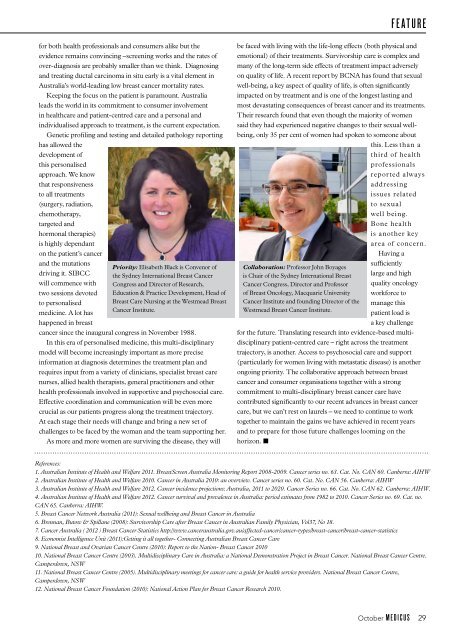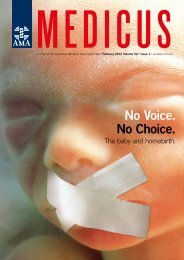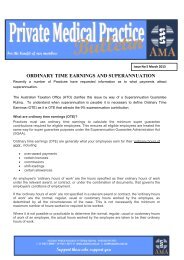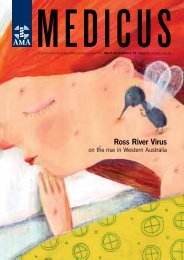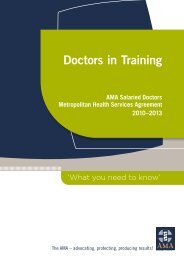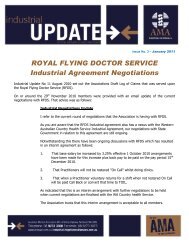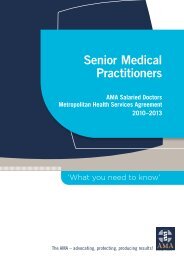twrama 1990_final oc.. - AMA WA
twrama 1990_final oc.. - AMA WA
twrama 1990_final oc.. - AMA WA
You also want an ePaper? Increase the reach of your titles
YUMPU automatically turns print PDFs into web optimized ePapers that Google loves.
FEATURE<br />
for both health professionals and consumers alike but the<br />
evidence remains convincing –screening works and the rates of<br />
over-diagnosis are probably smaller than we think. Diagnosing<br />
and treating ductal carcinoma in situ early is a vital element in<br />
Australia’s world-leading low breast cancer mortality rates.<br />
Keeping the f<strong>oc</strong>us on the patient is paramount. Australia<br />
leads the world in its commitment to consumer involvement<br />
in healthcare and patient-centred care and a personal and<br />
individualised approach to treatment, is the current expectation.<br />
Genetic profiling and testing and detailed pathology reporting<br />
has allowed the<br />
development of<br />
this personalised<br />
approach. We know<br />
that responsiveness<br />
to all treatments<br />
(surgery, radiation,<br />
chemotherapy,<br />
targeted and<br />
hormonal therapies)<br />
is highly dependant<br />
on the patient’s cancer<br />
and the mutations<br />
driving it. SIBCC<br />
will commence with<br />
two sessions devoted<br />
to personalised<br />
medicine. A lot has<br />
happened in breast<br />
Priority: Elisabeth Black is Convenor of<br />
the Sydney International Breast Cancer<br />
Congress and Director of Research,<br />
Education & Practice Development, Head of<br />
Breast Care Nursing at the Westmead Breast<br />
Cancer Institute.<br />
cancer since the inaugural congress in November 1988.<br />
In this era of personalised medicine, this multi-disciplinary<br />
model will become increasingly important as more precise<br />
information at diagnosis determines the treatment plan and<br />
requires input from a variety of clinicians, specialist breast care<br />
nurses, allied health therapists, general practitioners and other<br />
health professionals involved in supportive and psychos<strong>oc</strong>ial care.<br />
Effective coordination and communication will be even more<br />
crucial as our patients progress along the treatment trajectory.<br />
At each stage their needs will change and bring a new set of<br />
challenges to be faced by the woman and the team supporting her.<br />
As more and more women are surviving the disease, they will<br />
be faced with living with the life-long effects (both physical and<br />
emotional) of their treatments. Survivorship care is complex and<br />
many of the long-term side effects of treatment impact adversely<br />
on quality of life. A recent report by BCNA has found that sexual<br />
well-being, a key aspect of quality of life, is often significantly<br />
impacted on by treatment and is one of the longest lasting and<br />
most devastating consequences of breast cancer and its treatments.<br />
Their research found that even though the majority of women<br />
said they had experienced negative changes to their sexual wellbeing,<br />
only 35 per cent of women had spoken to someone about<br />
this. Less t han a<br />
third of health<br />
professionals<br />
reported always<br />
addressing<br />
issues related<br />
to sexual<br />
well being.<br />
Bone health<br />
is another key<br />
area of concern.<br />
Having a<br />
Collaboration: Professor John Boyages<br />
is Chair of the Sydney International Breast<br />
Cancer Congress, Director and Professor<br />
of Breast Oncology, Macquarie University<br />
Cancer Institute and founding Director of the<br />
Westmead Breast Cancer Institute.<br />
sufficiently<br />
large and high<br />
quality oncology<br />
workforce to<br />
manage this<br />
patient load is<br />
a key challenge<br />
for the future. Translating research into evidence-based multidisciplinary<br />
patient-centred care – right across the treatment<br />
trajectory, is another. Access to psychos<strong>oc</strong>ial care and support<br />
(particularly for women living with metastatic disease) is another<br />
ongoing priority. The collaborative approach between breast<br />
cancer and consumer organisations together with a strong<br />
commitment to multi-disciplinary breast cancer care have<br />
contributed significantly to our recent advances in breast cancer<br />
care, but we can’t rest on laurels – we need to continue to work<br />
together to maintain the gains we have achieved in recent years<br />
and to prepare for those future challenges looming on the<br />
horizon. ■<br />
References:<br />
1. Australian Institute of Health and Welfare 2011. BreastScreen Australia Monitoring Report 2008-2009. Cancer series no. 63. Cat. No. CAN 60. Canberra: AIHW<br />
2. Australian Institute of Health and Welfare 2010. Cancer in Australia 2010: an overview. Cancer series no. 60. Cat. No. CAN 56. Canberra: AIHW<br />
3. Australian Institute of Health and Welfare 2012. Cancer incidence projections: Australia, 2011 to 2020. Cancer Series no. 66. Cat. No. CAN 62. Canberra: AIHW.<br />
4. Australian Institute of Health and Welfare 2012. Cancer survival and prevalence in Australia: period estimates from 1982 to 2010. Cancer Series no. 69. Cat. no.<br />
CAN 65. Canberra: AIHW.<br />
5. Breast Cancer Network Australia (2011): Sexual wellbeing and Breast Cancer in Australia<br />
6. Brennan, Butow & Spillane (2008): Survivorship Care after Breast Cancer in Australian Family Physician, Vol37, No 18.<br />
7. Cancer Australia ( 2012 ) Breast Cancer Statistics http://www.canceraustralia.gov.au/affected-cancer/cancer-types/breast-cancer/breast-cancer-statistics<br />
8. Economist Intelligence Unit (2011):Getting it all together- Connecting Australian Breast Cancer Care<br />
9. National Breast and Ovarian Cancer Centre (2010): Report to the Nation- Breast Cancer 2010<br />
10. National Breast Cancer Centre (2003). Multidisciplinary Care in Australia: a National Demonstration Project in Breast Cancer. National Breast Cancer Centre.<br />
Camperdown, NSW<br />
11. National Breast Cancer Centre (2005). Multidisciplinary meetings for cancer care: a guide for health service providers. National Breast Cancer Centre,<br />
Camperdown, NSW<br />
12. National Breast Cancer Foundation (2010): National Action Plan for Breast Cancer Research 2010.<br />
October MEDICUS 29


